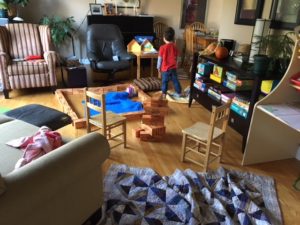
Spoiler alert – I am about to seriously date myself. I grew up in the day when we came home from school, got into our play clothes, and disappeared out into the street. At supper time mom would throw open the door and holler for us to come and eat. The message was relayed from kid to kid down the street until someone finally came running up to us to say that it was our mom yelling. We would go in, eat, and run right back out the door until the streetlights came on.
Yes we played organized sports as well, but the majority of our leisure time was spent in free play with the neighbourhood kids. We played hide and seek, climbed trees much higher than any parent would ever dream of letting their child do now, hopped fences with pointy pokey wire on top, and probably did a lot of things our parents wouldn’t have wanted to know about. And we survived with little more than a few stitches.
Obviously times have changed and parents are less and less comfortable raising free range kids. However, the benefits I experienced can still be realized in a slightly more controlled environment. For instance, Saturday mornings in our house are spent with my kids free ranging the house and yard. They have plenty of toys that promote imagination and they have free rein to do whatever they want for as long as they want.
So why is this so important? The following are the most significant benefits of free play when we well meaning adults keep our noses out of it.
Nurturing Imagination and Creativity
“Imagination is more important than knowledge.” Albert Einstein
Imagination is the door to possibility. The imagination of children is limitless – if we nurture it through things such as free play. It fosters cognitive and social development and it is the birthplace of creativity. In order to invent something you first have to imagine it. Through imagination children learn to try new things, see things in different ways, and explore the extraordinary. Do you remember that book All I Really Need to Know I Learned in Kindergarten? Yeah, ‘nuff said. Here is a great article with ideas on how to encourage imaginative play.
Developing Physical Strength and Coordination
When children participate in varied activities they develop lots of different patterns of movement rather than always being stuck doing the same thing. For instance, climbing things really works the extensor muscles, which are more in the back of the body, while things like running and biking tend to work more the muscles in the front. Also, when children play freely they tend to do lots of movements that they wouldn’t necessarily do in an organized sport, such as rolling down a hill, hanging upside-down, and twisting.
When children play the same sport all the time (often competitive athletes have no time for free play) the opposite happens. They can get stuck in one particular movement pattern and they don’t develop well-balanced musculature. This is particularly problematic in developing children. Not only can it affect their overall coordination and balance, it makes them more prone to injury. I see this often in my practice and I encourage parents to ensure that their children have opportunities to move in different movement patterns.

Learning Acceptable Levels of Risk
When adults are constantly hovering we tend not to allow our children to take much risk. More often than not this is due to our own fears and may be out of proportion for the situation. Add that to the fact that we live in a society ruled by fear of litigation and it is nothing short of a recipe for disaster.
Children who aren’t allowed to take risk don’t learn what acceptable risk is. When this happens things go one of two ways. They either become very timid and won’t take even the slightest risk (Oh my gosh, I couldn’t possibly jump across that tiny gap) or they take extreme risks and put themselves in danger (I can swing upside down three metres off the ground and land on my hands on that pavement below).
This article delves into this phenomenon and explains it very well. The bottom line is when children are experiencing free play they will take risks – and we need to let them.
Fostering Decision Making Skills
When children are allowed to play freely they have to decide what it is they would like to do, with whom, for how long, etc. This could mean deciding between going for the Legos with Leia first or the arts and crafts supplies with Jacob for instance. This allows children to make low stakes decisions (i.e. whatever they choose is safe), which form the building blocks for higher stakes decisions later in life. When we present children with a variety of options and let them go to it, they have to make numerous decisions. We take these things for granted but for children it is a skill that needs development. When we plan everything for them they don’t get a chance to practice this.
Exercising Conflict Resolution Strategies and Problem Solving
“I wanted THAT Lego!” “I saw it first!” Thirty thousand Lego pieces and they have to fight over the same one. Of course. As adults it is our job to teach children conflict resolution skills, but then we have to give them a chance to practice them on their own. When we don’t intervene (my own policy is to ignore until the screaming reaches levels suggestive of personal injury) it is surprising how often the kids can sort it out for themselves. The thing is, if you are hovering nearby they will likely come to you to resolve the issue. If you are not right there, it is much more likely they will figure it out for themselves.
Left to their own devices children can also be quite ingenious problem solvers. If a piece of some toy is missing they will find something to replace it. If the blue crayon is missing then the ocean can be green. The possibilities are endless when we let them deal with it on their own.
Encouraging Independence
The more opportunities we give children to play freely, the more confidence they will build in themselves as they develop all of the skills mentioned above. This leads to greater independence in all activities. Letting kids try things, sometimes failing, and dealing with that failure is really teaching them essential skills they will need as adults.
Free Range Kids – Even Better than Eggs
We all get the benefits of free range eggs. Well kids are just as awesome. Free range kids will be healthier, happier, more creative, more independent, be better able to manage risk, and be further ahead in developing essential life skills. Just be prepared to help clean up because free range can be messy!
